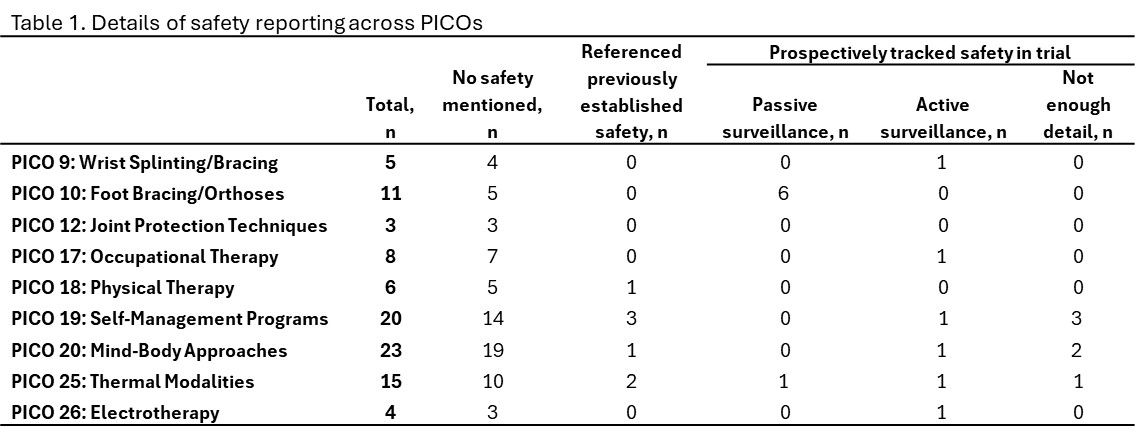Session Information
Date: Sunday, November 17, 2024
Title: Orthopedics, Low Back Pain, & Rehabilitation – ACR/ARP Poster
Session Type: Poster Session B
Session Time: 10:30AM-12:30PM
Background/Purpose: Rheumatoid arthritis (RA) is a chronic, systemic, inflammatory condition. Improved outcomes occur with early diagnosis, evaluation, and management. Management includes pharmacological, exercise, rehabilitation, diet, and other therapeutic interventions. A previous systematic review investigated the quality and nature of harms with exercise therapy. It is unclear how safety extends to non-exercise rehabilitation interventions. The purpose of this secondary analysis was to describe the frequency, quality, and nature of safety reporting among randomized controlled trials (RCTs) testing non-exercise rehabilitation interventions for adults with RA.
Methods: We conducted a secondary analysis of the RCTs identified from the systematic review that informed the evidence report for the American College of Rheumatology 2022 Integrative RA Treatment Guideline. Specifically, we identified the RCTs for the Population, Intervention, Comparator, and Outcome (PICO) questions regarding non-exercise rehabilitation interventions (i.e., bracing, orthoses, joint protection techniques, self-management programs, mind-body approaches, thermal modalities, and electrotherapy). Within each PICO of interest, each study was reviewed to determine if safety outcomes were reported (not mentioned, referenced safety as previously established, or prospectively tracked in the trial). If safety was prospectively tracked, the type of surveillance was recorded (active: study team asked or assessed adverse events, passive: relying on unprompted participant report of adverse event, or not enough detail to determine). Safety outcomes were extracted by one author (MM) and confirmed by a second author (JT, BD). Disputes were handled by a third reviewer (LT). Descriptive characteristics of each study were also extracted.
Results: Ninety-four articles, across 10 PICOs, were included in this review. Only 25 out of the 94 articles (26%) mentioned safety, either as previously established or prospectively tracked. Of the 17 trials that prospectively tracked safety outcomes (18% of total), five used active surveillance methods, seven used passive surveillance methods, and six articles did not have enough detail to determine the type of surveillance method. Further breakdown of the safety cited for each article within each PICO can be seen in Table 1. No serious adverse events were reported for any PICO. Adverse events were rare; most adverse events were reported in PICO 9 and 10 related to skin irritation/surface pain from bracing.
Conclusion: Most RCTs that investigate different therapeutic interventions for patients with RA did not report safety outcomes; when reported, adequate detail in reporting was rare. While rehabilitation interventions are often expected to be safe, better tracking and reporting of safety outcomes in future RCTs are critical to provide strong safety recommendations to inform shared decision making between clinicians and patients.
To cite this abstract in AMA style:
Mishra M, Torrey J, Dunn B, Thoma L. Safety of Non-Exercise Rehabilitation Interventions for Adults with Rheumatoid Arthritis [abstract]. Arthritis Rheumatol. 2024; 76 (suppl 9). https://acrabstracts.org/abstract/safety-of-non-exercise-rehabilitation-interventions-for-adults-with-rheumatoid-arthritis/. Accessed .« Back to ACR Convergence 2024
ACR Meeting Abstracts - https://acrabstracts.org/abstract/safety-of-non-exercise-rehabilitation-interventions-for-adults-with-rheumatoid-arthritis/

